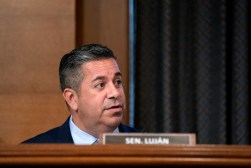FCC to reinstate council tasked with studying AI’s impact on communications networks

The Federal Communications Commission is reinstating its Communications Security, Reliability and Interoperability Council, with plans for this iteration of the ninth CSRIC focused specifically on artificial intelligence and machine learning.
The council, in compliance with the White House’s AI executive order, will be tasked by the FCC with considering the role that the technology plays in enhancing communication networks and the reliability risks it poses for emerging technologies like 6G networks and next-generation 911 networks, according to the public notice. The council is expected to begin meeting in June 2024 and convene for two years
Chairwoman Jessica Rosenworcel is seeking nominations for CSRIC IX; the council will be co-chaired by the Cybersecurity and Infrastructure Security Agency.
“The FCC is continuing our work with our federal partners and the private sector to bolster the security and resiliency of the nation’s communications networks and I am pleased that CISA has agreed to again co-chair” CSRIC, Rosenworcel said in the release. “CSRIC is one of our key venues for tackling these complex issues, which is why I am once again re-establishing CSRIC and charging it with developing plans to address the communications security challenges of tomorrow, setting a path for a more secure and innovative future.”
In the executive order, the agency is “encouraged” to examine the potential for AI to enhance spectrum management and non-federal spectrum usage, as well as expand potential opportunities for non-federal spectrum sharing.
Additionally, the FCC is required to offer support for efforts to improve network security and interoperability that involve AI, which includes “self-healing networks,” 6G and Open RAN.
The agency previously voted to launch an inquiry on AI’s impact on robocalls and robotexts, another responsibility that the executive order encourages the FCC to fulfill through rulemaking.




